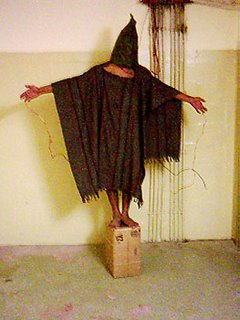 As we contemplate the men and women in uniform who have fallen in combat on the behalf of our nation this Memorial Day weekend it is worth remembering not only those who have honored their uniform but those who have dishonored it. I am, of course, talking about the torture and mistreatment of detainees (a.k.a. unlawful combatants) under our control taken from Afghanistan and Iraq in the ongoing conflicts there.
As we contemplate the men and women in uniform who have fallen in combat on the behalf of our nation this Memorial Day weekend it is worth remembering not only those who have honored their uniform but those who have dishonored it. I am, of course, talking about the torture and mistreatment of detainees (a.k.a. unlawful combatants) under our control taken from Afghanistan and Iraq in the ongoing conflicts there.The torture and mistreatment of prisoners in the custody of the United States armed forces and civilian intelligence services brings us nothing but shame. It is simply wrong. Period.
This isn’t just a complaint of dreamy idealists with their heads in the clouds and not well grounded in the messiness of the real world. The real world is messy and we must be prepared to dirty our hands in situations determined by shades of gray rather than black and white. But it is precisely because the world is a messy place that we have set legal and moral guidelines as to how to act. Americans must speak out against what is wrong.
Torture and mistreatment of detainees is not only wrong but is counterproductive. Of course the strong hold out and the weak confess to anything but it goes beyond that. As President Bush has said we are engaged in a war of ideas. Those who engage in theses activities and their apologists do little to advance our cause. Rather they undermine our cause and harm our country. They betray the soldiers who put their lives on the line on the battlefield and they betray us.
Today’s Washington Post has a short piece by Alberto J. Mora. He is a retired Navy general counsel and had written a memo to Pentagon officials two years before the Abu Ghraib scandal that warned against circumventing international agreements on torture and detainee treatment. He states:
It is astonishing to me, still, that I should be here today addressing the issue of American cruelty -- or that anyone would ever have to. Our forefathers,
who permanently defined our civic values, drafted our Constitution inspired by
the belief that law could not create but only recognize certain inalienable
rights granted by God -- to every person, not just citizens, and not just here
but everywhere. Those rights form a shield that protects core human dignity.
Because this is so, the Eighth Amendment prohibits cruel punishment. The
constitutional jurisprudence of the Fifth and Fourteenth Amendments outlaws
cruel treatment that shocks the conscience. The Geneva Conventions forbid the
application of cruel, inhuman and degrading treatment to all captives, as do all
of the major human rights treaties adopted and ratified by our country during
the last century.
Despite this, there was abuse. Not all were mistreated, but some were.
For those mistreated, history will ultimately judge what the precise quantum of
abuse inflicted was -- whether it was torture or some lesser cruelty -- and
whether it resulted from official commission or omission, or occurred despite
every reasonable effort to prevent the abuse. Whatever the ultimate historical
judgment, it is established fact that documents justifying and authorizing the
abusive treatment of detainees during interrogation were approved and
distributed. These authorizations rested on three beliefs: that no law
prohibited the application of cruelty; that no law should be adopted that would
do so; and that our government could choose to apply the cruelty -- or not -- as
a matter of policy depending on the dictates of perceived military necessity.
He asks, “Will we continue to regard the protection and promotion of
human dignity as the essence of our national character and purpose, or will we
bargain away human and national dignity in return for an additional possible
measure of physical security?”
He goes on:
Why should we still care about these issues? The Abu Ghraib abuses have been
exposed; Justice Department memoranda justifying cruelty and even torture have
been ridiculed and rescinded; the authorizations for the application of extreme
interrogation techniques have been withdrawn; and, perhaps most critically, the
Detainee Treatment Act of 2005, which prohibits cruel, inhuman and degrading
treatment, has been enacted, thanks to the courage and leadership of Sen. John
McCain.
We should care because the issues raised by a policy of cruelty
are too fundamental to be left unaddressed, unanswered or ambiguous. We should
care because a tolerance of cruelty will corrode our values and our rights and
degrade the world in which we live. It will corrupt our heritage, cheapen the
valor of the soldiers upon whose past and present sacrifices our freedoms
depend, and debase the legacy we will leave to our sons and daughters. We should
care because it is intolerable to us that anyone should believe for a second
that our nation is tolerant of cruelty. And we should care because each of us
knows that this issue has not gone away.
You can read the whole piece here.
No comments:
Post a Comment